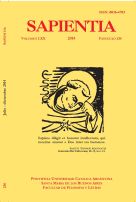Please use this identifier to cite or link to this item:
https://repositorio.uca.edu.ar/handle/123456789/4609| Título: | La política en la actualidad : ¿más cerca de la virtud o del vicio? | Autor: | Yáñez Rojas, Eugenio | Palabras clave: | Machiavelli, Niccolò, 1469-1527; FILOSOFIA POLITICA; POLITICA; DEMOCRACIA; ETICA; DOCTRINA SOCIAL DE LA IGLESIA | Fecha de publicación: | 2014 | Editorial: | Pontificia Universidad Católica Argentina. Facultad de Filosofía y Letras | Cita: | Yáñez Rojas, E. La política en la actualidad : ¿más cerca de la virtud o del vicio? [en línea]. Sapientia. 2014, 70 (236). Disponible en: https://repositorio.uca.edu.ar/handle/123456789/4609 | Resumen: | Resumen: En este artículo se expone en forma sucinta dos formas muy diferentes de concebir la política, a saber: la de algunos autores denominados clásicos, cuyos principales representantes son Platón, Aristóteles, Cicerón y Tomás de Aquino, y la forma moderna representada por Maquiavelo. Los primeros, salvando algunas diferencias, entienden la política como un saber moral práctico, como una noble actividad que debe ser ejercida por los mejores en vistas al bien de todos. Maquiavelo, por su parte, la entiende como una técnica, totalmente desarraigada de la moral, cuyo fin es obtener, mantener y acrecentar el poder. Al parecer, y es lo que se intentará demostrar en la exposición, hay indicios suficientes para afirmar que el maquiavelismo se ha «impuesto» a los clásicos. La perspectiva desde la cual se abordara esta pregunta, es la del Magisterio reciente de la Iglesia Católica Abstract: This article briefly discussed in two very different ways of thinking about politics, namely that of some classic authors, whose main representatives are Plato, Aristotle, Cicero and Aquinas, and modern represented by Machiavelli. The first, saving some differences, understand politics as a practical moral knowledge as a noble activity that must be exerted by the best in view of the good of all. Machiavelli, meanwhile, sees it as a technique, totally uprooted morals, whose purpose is to obtain, maintain and increase power. Apparently, and this is what we will try to show in the exhibition, there is enough evidence to state that Machiavellianism was «imposed» on the classics. The perspective from which this question is addressed, is the recent Magisterium of the Catholic Church. |
URI: | https://repositorio.uca.edu.ar/handle/123456789/4609 | ISSN: | 0036-4703 | Disciplina: | FILOSOFIA | Derechos: | Acceso Abierto | Fuente: | Sapientia, 70(236), 2014 |
| Appears in Collections: | SAP - 2014 Vol LXX nro. 236 |
Files in This Item:
| File | Description | Size | Format | |
|---|---|---|---|---|
| politica-actualidad-virtud-vicio.pdf | 178,9 kB | Adobe PDF |  View/Open |
Page view(s)
714
checked on Apr 30, 2024
Download(s)
1,214
checked on Apr 30, 2024
Google ScholarTM
Check
This item is licensed under a Creative Commons License

